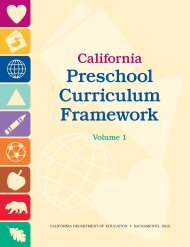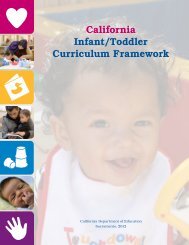California Preschool Learning Foundations - ECEZero2Three ...
California Preschool Learning Foundations - ECEZero2Three ...
California Preschool Learning Foundations - ECEZero2Three ...
You also want an ePaper? Increase the reach of your titles
YUMPU automatically turns print PDFs into web optimized ePapers that Google loves.
SOCIAL-EMOTIONAL DEVELOPMENT<br />
34<br />
children to look forward to coming to<br />
school, to have a more positive classroom<br />
experience, and to achieve more<br />
as students (Ladd, Kochenderfer, and<br />
Coleman 1996, 1997; Ladd, Birch, and<br />
Buhs 1999).<br />
Research on the friendships of preschool<br />
children reveals that close<br />
relationships between peers tend<br />
to be stable over time; but with the<br />
children’s increasing age, these friendships<br />
become more reciprocal, more<br />
exclusive (i.e., children are more likely<br />
to exclude other children from the<br />
activities they share with friends), and<br />
friends become more psychologically<br />
aware of the relationship they share<br />
(see reviews by Gottman 1983; Parker<br />
and Gottman 1989; Rubin and others<br />
Friendships become characterized<br />
by more complex play between friends<br />
and more positive and affectionate<br />
behavior. But, somewhat surprisingly,<br />
there can be greater conflict between<br />
friends than in interactions<br />
with nonfriends.<br />
2005; Rubin, Bukowski, and Parker<br />
2006; Vandell, Nenide, and Van Winkle<br />
2006). Friendships become characterized<br />
by more complex play between<br />
friends and more positive and affectionate<br />
behavior. But, somewhat surprisingly,<br />
there can be greater conflict<br />
between friends than in interactions<br />
with nonfriends. The greater incidence<br />
of conflict may derive both from the<br />
greater frequency of friendship interaction<br />
and the greater emotional investment<br />
in these interactions. However,<br />
toward the end of the preschool years,<br />
friends are more likely to negotiate<br />
with each other, to disengage from<br />
disagreements before conflict worsens,<br />
and to find other ways of maintaining<br />
their friendship beyond the disagreement<br />
(Gottman 1983; Hartup 1996;<br />
Howes, Droege, and Matheson 1994;<br />
Parker and Gottman 1989). In these<br />
ways, then, broader features of developing<br />
social and emotional competences<br />
in early childhood contribute<br />
to the maintenance of friendship in<br />
older preschoolers and their greater<br />
endurance over time.<br />
<strong>Preschool</strong> <strong>Learning</strong> <strong>Foundations</strong>, Volume 1 • <strong>California</strong> Department of Education
















